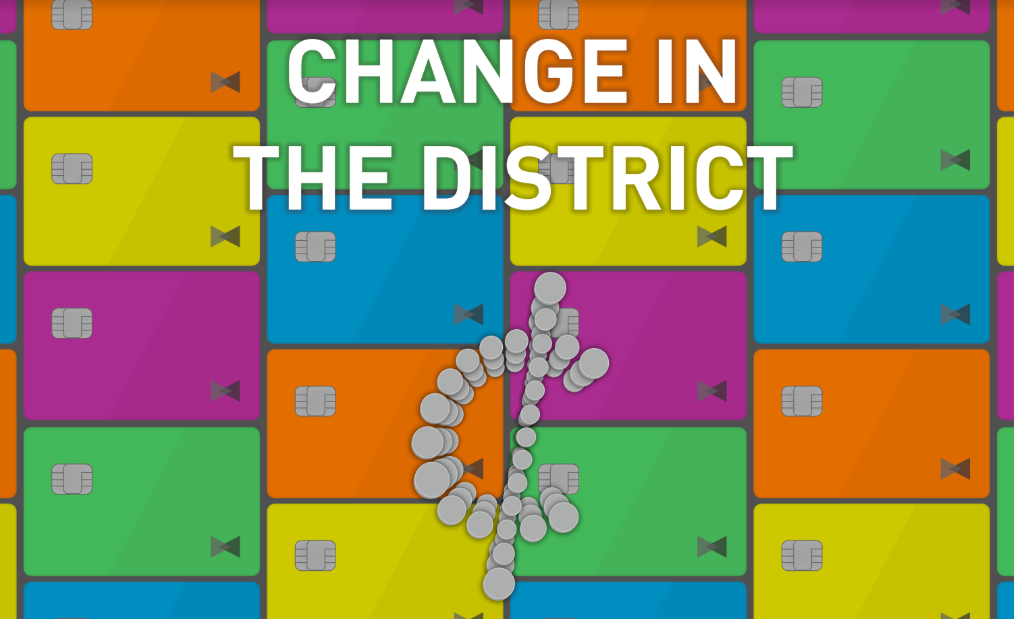“No Cashew Money,” reads a sign in the window of the fast-casual salad chain Sweetgreen. At Sweetgreen’s 12 D.C. locations, as well as many of their national storefronts, cash is no longer accepted as a form of payment.
Sweetgreen is among a number of D.C. businesses to go cashless, including JRINK, Menchie’s, and select Surfside and Jetties locations. At Georgetown University, The Corp, officially made the shift on Feb. 1. Now, their six on-campus locations exclusively accept cashless payments.
“The decision to go cashless was mostly financially and operationally motivated,” said Jared D’Sa, CFO of The Corp from February 2017 to February 2018 who oversaw the cashless transition. “It saves us a ton of money on the backend, and on-shift managers don’t have to deal with cash or the general lack of security with cash as a whole. It’s a lot more secure to have all our payments online.”
According to Joelle Wiese, associate vice president of auxiliary services, the university was not involved in The Corp’s decision to go cashless.
“Most of Georgetown’s dining, retail and merchandising locations accept both cash and cashless payments, and will continue to do so,” said Wiese in an email to the Voice. “We are committed to ensure our community members can continue using a variety of payment methods, including both cash and cashless payments.”
Theft prevention is a predominant factor in this industry-wide shift, as are expedited transaction times and rising labor costs. For many businesses and patrons, phasing out cash seems to be a natural move.
Naomi Kasbekar, a 21-year-old Sweetgreen customer, doesn’t mind the lack of payment options at the store. “Everyone has a card nowadays so it doesn’t matter,” said Kasbekar.
For over 90 percent of both The Corp’s and Sweetgreen’s diners, it doesn’t matter; less than 10 percent of their transactions involved cash prior to their switch to cashless payment systems. But for those within the 10 percent who lack access to electronic banking, these businesses are now inaccessible.
“It is kind of discriminatory practice,” said Jennifer McLaughlin, outreach director of People for Fairness Coalition, a group which advocates on behalf of District residents facing housing insecurity. McLaughlin fears the consequences of an increasing number of vendors refusing to accept cash. “We deal with a lot of people who are homeless and some panhandle,” she said. “If they want to go and get a drink, they’re not going to be able to do that. It’s a hindrance against the communities we serve.”
An increase in cashless businesses would not only affect the estimated 7,000 individuals experiencing homelessness in the District who may not have a bank account. According to a 2015 Prosperity Now report, 12 percent of D.C. households are unbanked, meaning no resident in the household holds a banking account. The FDIC National Survey of Unbanked and Underbanked Households cites individuals not having enough money to maintain account minimums and distrust of banks as the most common factors deterring people from keeping their money in banks. Not accounted for in the statistic are young patrons who may not yet have a credit or debit card, or the 25 percent of D.C. households which are underbanked, often lacking the financial stability for consistent credit payments.
In D.C. in particular, the issue is connected to the physical locations of banks. A study conducted by a University of Wisconsin professor found that the District ranked third for metro areas with the highest number of bank deserts, or areas without sufficient access to FDIC-insured banks. In Wards 7 and 8, the wards with the lowest median household income, banks are particularly sparse. Ward 8 has one branch per 13,000 residents, compared with the U.S. urban average of one branch per 2,000 residents.
D.C. At-Large Councilmember David Grosso said there is “blatant discrimination” within the D.C. banking system which contributes the difficulties some face in securing cards.
“There are banks that are unwilling to establish brick and mortar locations in Wards 7 and 8, and when someone from Wards 7 or 8 want to open a bank account, it’s usually more expensive or there are more fees,” Grosso said. “There are higher interest rates, which makes it cost prohibitive to open an account. It is a little insensitive of the establishments to think that everyone has access to a credit card.”
Like this handful of restaurants, Washington Metropolitan Area Transit Authority (WMATA) has indicated interest in removing cash payment options from its Metrobuses. In a statement issued by WMATA general manager Paul Wiedefeld to Grosso, 10 percent of riders use cash when boarding, demonstrating a statistic similar to that of other businesses. On June 24, WMATA began a six-month pilot period on Metro Extra Route 79 during which riders can only pay with SmarTrip cards.
The objective of the pilot is to speed up notoriously slow Metrobus rides. While the switch could particularly benefit residents of Ward 7 and 8, who face the longest average commute times in the District according to the DC Economic Strategy website, the preparation required to pre-fill SmarTrip cards could create another hurdle for residents.
Because Wards 7 and 8 contain 75 percent of D.C. regions designated as food deserts, according to a report by Randy Smith of the DC Policy Center, many residents rely on public transportation to buy groceries. Barring access to transport could exacerbate inequities in food access for non-cardholding residents, within ward lines and the city as a whole.
On June 26, Grosso introduced the “Cashless Retailers Prohibition Act of 2018” alongside Councilmembers Anita Bonds, Brianne Nadeau, Vincent Gray, Trayon White, and Chairman Phil Mendelson. The legislation intends to reverse the trend of cash phaseouts and, if passed, would amend Title 28 of the District of Columbia Official Code, making it discriminatory to deny patrons a product or service due to payment preference. The bill is currently under council review.
“The introduction of the legislation was prompted by more and more restaurants going cashless,” Grosso said. “It’s basically businesses telling low-income people, undocumented people, and young patrons that they’re not welcome in their establishments. I think that this is a way for us to say to the restaurant industry that we haven’t completely switched over.”
Chaia, a fast-casual Georgetown restaurant, is not exclusively cashless, although some of its competitors are. Co-owner Bettina Stern finds the prospect appealing for its efficiency and safety, but said Chaia has not yet switched due to costly credit card fees and reluctance to contribute to an economy of consumer debt. Despite concerns over cashless policies, Stern does not believe Grosso’s legislation would be constructive.
“Grosso’s proposed bill would substitute the judgement of a few city councilmembers (6 out of 13) for that of businesses like ours who are far more in tune with our customers’ payment preferences,” Stern wrote in an email to the Voice. “These businesses, not the government, should be the ones making minute decisions about our work.”
Restaurants have yet to incorporate alternative payment methods for residents who are unable or unwilling to open a bank account. In the case of The Corp, continuing to accept cash would sacrifice more than convenience.
“I think it’s no secret that The Corp has kind of been struggling financially within the last five to seven years,” said D’Sa. “This [change] enables us to give back to the community. The year before last, we gave around $80,000 in scholarship and this year we gave around $100,000. A lot of that was due to the money we saved in going cashless.”
Corp leadership held a town hall for students to voice concerns about cashless stores, and created an email account to address other issues during the transition, according to D’Sa. Undocumented students, high schoolers, and campus workers were taken into consideration during the decision.
“The Corp actually consulted me in this process last year before they went cashless and I was very grateful for that,” wrote Arelis Palacios, associate director of undocumented services on Georgetown’s campus, in an email to the Voice. “It was a very courteous inquiry that showed awareness and sensitivities to this issue.”
Undocumented residents comprise an estimated 3.9 percent of the D.C. population, according to Pew Research Center, and many of them may face added hurdles in opening bank accounts.
Lizzette Arias is the executive director of the Dream Project in Virginia, a non-profit which supports undocumented students pursuing college degrees. She believes no-cash policies mostly impact newly-arrived and elderly members of the undocumented population.
“There’s a lot of misinformation in the community,” Arias said. “I know a lot of people don’t think they’re even eligible to open a bank account because they don’t have a social security number. That’s not true and that myth has been waning, but it’s still out there. I’m sure there’s a lot of fear over stepping into a bank and saying, ‘I don’t have the right documents, but would you keep my money?’ ”
While the trend could cause immediate economic repercussions on the individual level, Arias suspects that there could be long-term social consequences to follow.
“If we have certain restaurants and shops that only take cards, then there’s going to be a new market for restaurants that only take cash. I think there will be kind of a self-segregation,” said Arias. “Once you’re splitting experiences in the same community, you’re segregating it.”
Grosso also sees how eliminating payment options could entrench divisions within the District, believing racial bias exaggerates the security issues associated with cash. Some business owners have told him they will not locate east of the river, a primarily black region, unless permitted to go cashless.
“But I think that statement alone points to the problems that we have with this kind of approach to paying for food,” said Grosso. “I just worry that if we go down this path, you’re going to see more and more of a division in our city between the haves and the have-nots, and ultimately that’s not good for anybody.”






[…] justify its cashless policy, The Corp cites the increased security of online payments and the streamlining of its operations, among other […]